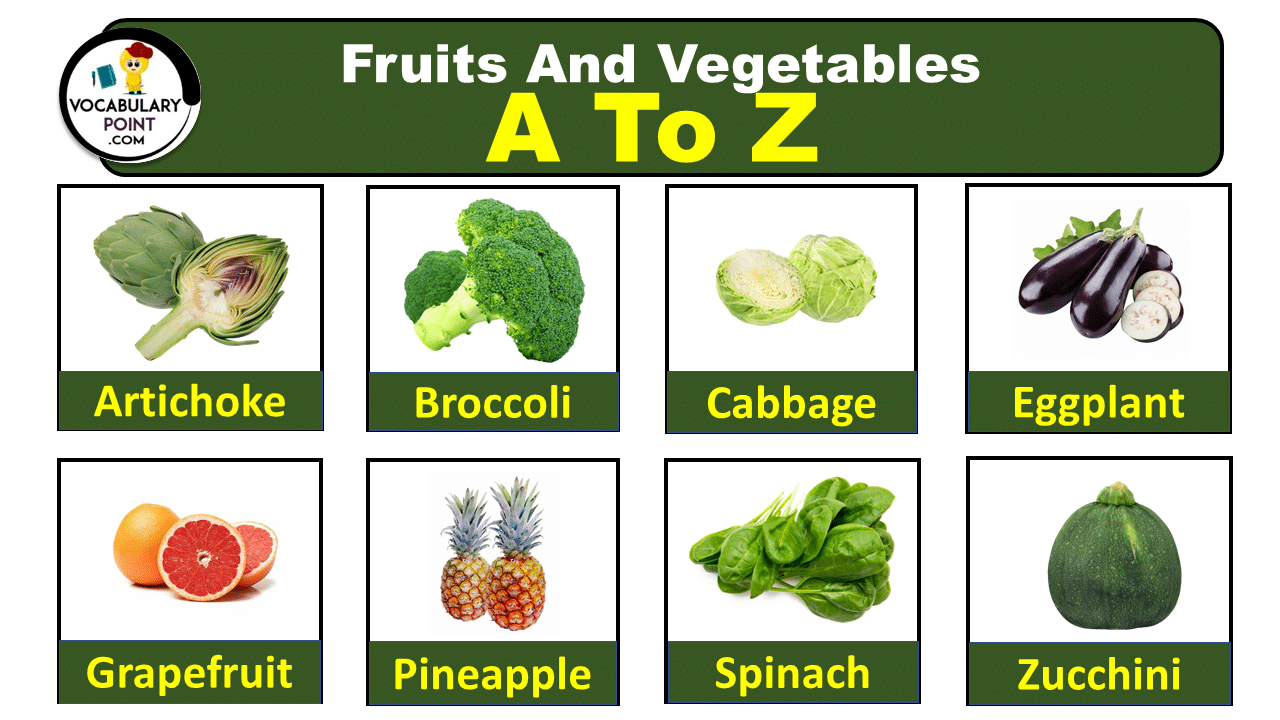Are you looking to incorporate more fruits and vegetables into your diet but find it overwhelming to navigate through the vast variety available? Look no further! In this comprehensive article, we have compiled an A to Z list of fruits and vegetables that will make it easier for you to explore new options and discover the incredible health benefits they offer.
Here are Most Popular Fruits and Vegetables A to Z:
- A – Apple, Avocado, Asparagus
- B – Banana, Blueberry, Broccoli
- C – Cherry, Carrot, Cucumber
- D – Date, Dragon Fruit, Eggplant
- E – Elderberry
- F – Fig
- G – Grapes, Guava, Green Beans
- H – Honeydew Melon
- I – Kiwi
- J – Jackfruit, Jicama
- K – Kiwifruit, Kale
- L – Lemon, Lettuce
- M – Mango, Mushroom
- N – Nectarine
- O – Orange, Onion
- P – Peach, Pear, Potato
- Q – Quince
- R – Raspberry
- S – Strawberry, Spinach, Squash
- T – Tomato
- U – Ugli Fruit
- V – Vanilla Bean
- W – Watermelon
- X – Xigua
- Y – Yam
- Z – Zucchini
Fruits And Vegetables List A to Z
- Apple
- Apricot
- Artichoke
- Asparagus
- Avocado
- Banana
- Banana Pepper
- Beet
- Bell Pepper
- Blackberry
- Blueberry
- Broccoli
- Brussels Sprout
- Butternut
- Cabbage
- Cactus Pear
- Cantaloupe
- Carrot
- Cauliflower
- Chard
- Cherry
- Clementine
- Coconut
- Corn
- Cranberry
- Cucumber
- Date
- Dragonfruit
- Eggplant
- Endive
- Fennel
- Fig
- Garlic
- Grape
- Grapefruit
- Green Bean
- Green Onion
- Guava
- Honeydew
- Jackfruit
- Jicama
- Kale
- Kiwi
- Kohlrabi
- Kumquat
- Leek
- Lemon
- Lettuce
- Lime
- Lychee
- Mango
- Mulberry
- Mushroom
- Nectarine
- Okra
- Olive
- Onion
- Orange
- Papaya
- Passionfruit
- Peach
- Pear
- Persimmon
- Pineapple
- Plantain
- Plum
- Pomegranate
- Pomelo
- Potato
- Pumpkin
- Radicchio
- Radish
- Rambutan
- Raspberry
- Rhubarb
- Rutabaga
- Shallot
- Snow Pea
- Spinach
- Squash
- Starfruit
- Strawberry
- Sunchokes
- Sweet Potato
- Tamarind
- Tangerine
- Tomato
- Turnip
- Ugli Fruit
- Watercress
- Watermelon
- Yucca
- Zucchini
Must Read: 50 YELLOW FRUIT NAMES
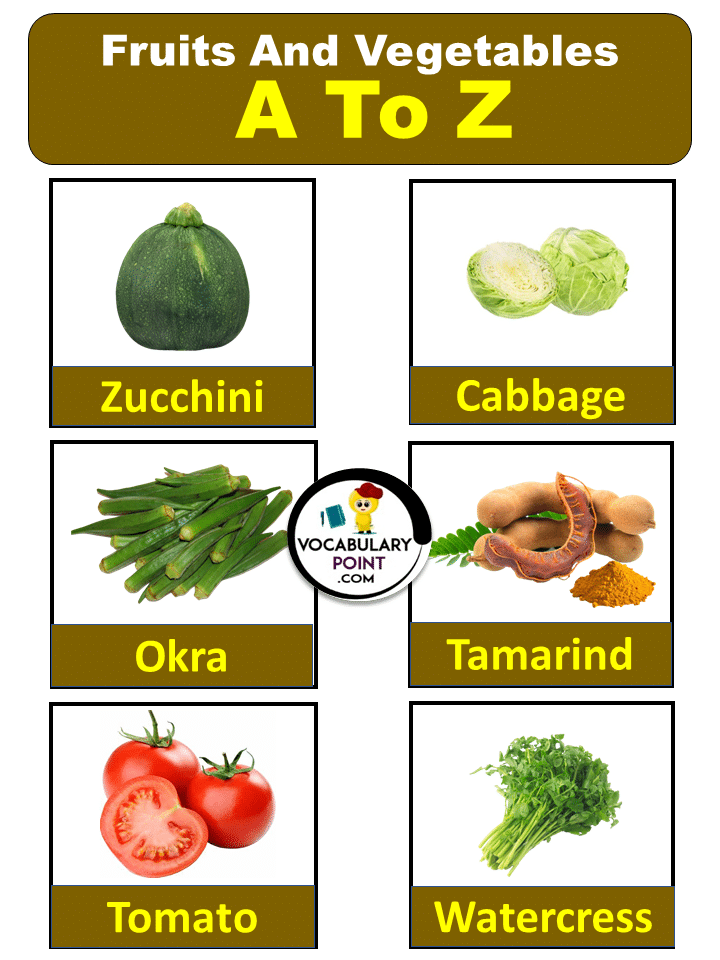
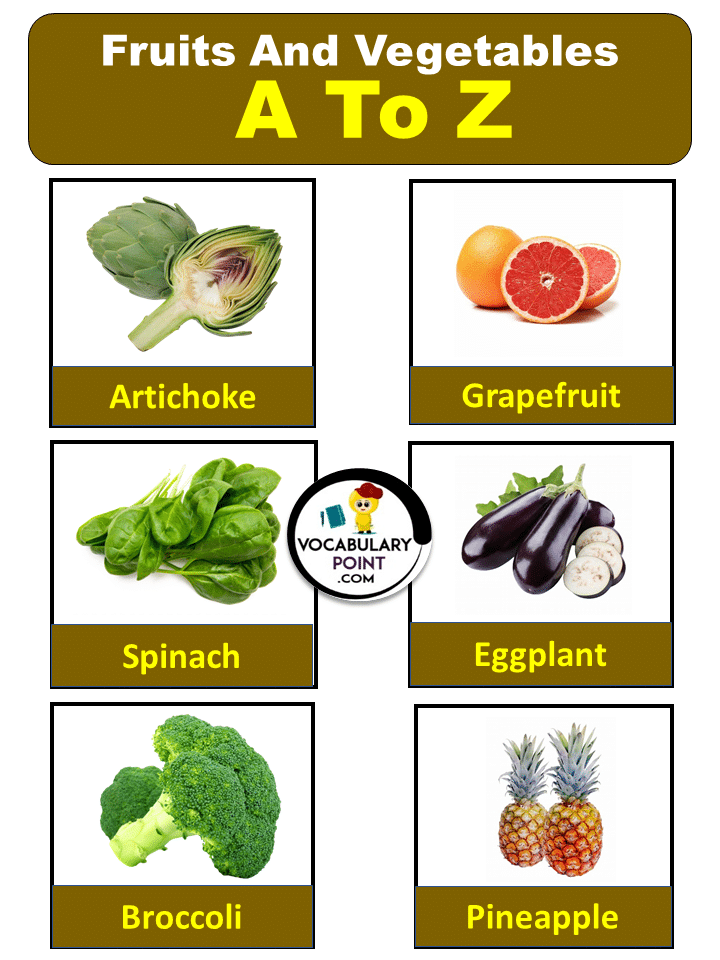
Fruits And Vegetables List With Their Benefits
Artichoke
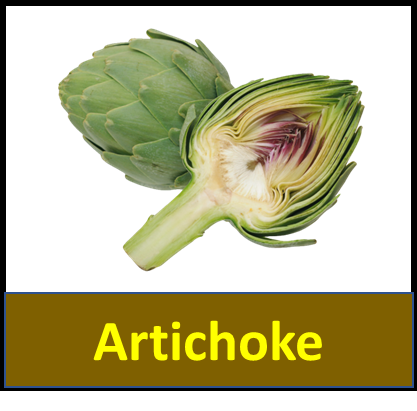
- Enhances Digestive Health:
Artichokes contain a compound called cynarin that stimulates bile production, aiding digestion and promoting the absorption of nutrients. This can contribute to a healthier gut and improved digestive processes.
- Antioxidant Powerhouse:
Loaded with antioxidants like quercetin and rutin, artichokes help combat oxidative stress, reducing the risk of chronic diseases. These compounds also support immune function, safeguarding the body against various illnesses.
- Heart-Friendly Properties:
Artichokes are rich in fiber and potassium, which together contribute to maintaining healthy blood pressure levels. Additionally, their high antioxidant content can help reduce LDL cholesterol oxidation, promoting cardiovascular well-being.
Grapefruit
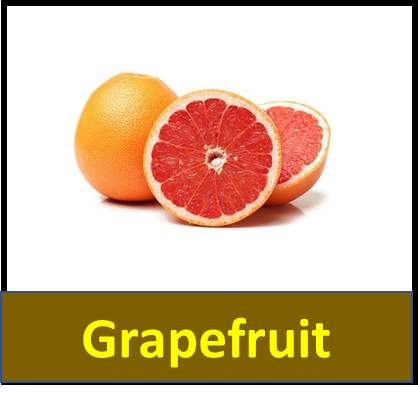
- Weight Management Support:
Grapefruit is low in calories and high in fiber, making it a great addition to a weight management plan. Its unique enzymes may also aid in digestion and help regulate blood sugar levels, potentially assisting in weight control.
- Immune System Boost:
Packed with vitamin C, grapefruit can bolster the immune system by promoting the production and activity of immune cells. This can enhance the body’s ability to fend off infections and illnesses.
- Skin Health Enhancement:
The antioxidants present in grapefruit, such as vitamin A and lycopene, contribute to maintaining healthy skin. They help combat free radicals that can lead to premature aging, supporting a more youthful and radiant complexion.
Spinach
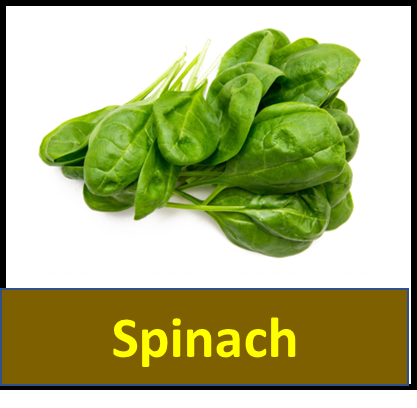
- Bone Strength Support:
Spinach is a rich source of vitamin K, which plays a crucial role in bone health by assisting in calcium absorption and regulating bone mineralization. Regular consumption can contribute to maintaining strong and healthy bones.
- Brain Function Enhancement:
The high content of folate in spinach is essential for cognitive function and mental health. Folate helps in the production of neurotransmitters, promoting proper brain function and potentially reducing the risk of cognitive decline.
- Blood Pressure Regulation:
With its high potassium and low sodium content, spinach can contribute to maintaining a healthy blood pressure level. Potassium helps counteract the effects of sodium, promoting balanced blood pressure and overall cardiovascular well-being.
Eggplant
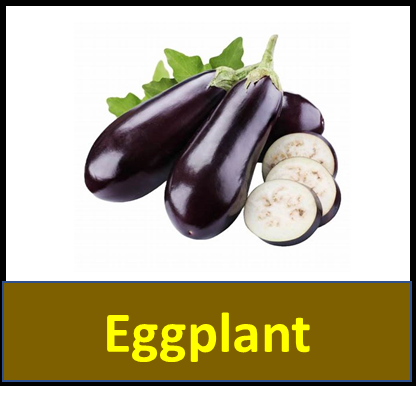
- Heart Health Promotion:
Eggplants are rich in antioxidants, particularly nasunin, which helps in reducing oxidative stress and preventing the oxidation of LDL cholesterol. This can lead to improved heart health and a decreased risk of cardiovascular diseases.
- Digestive System Support:
High in dietary fiber, eggplants can aid in promoting regular bowel movements and preventing constipation. Fiber also supports a healthy gut by promoting the growth of beneficial gut bacteria.
- Blood Sugar Management:
Eggplants have a low glycemic index and are a good source of soluble fiber. This combination can help regulate blood sugar levels, making them a suitable addition to the diet of individuals with diabetes or those aiming to manage their blood sugar.
Broccoli

- Cancer Prevention:
Broccoli is packed with compounds like sulforaphane, which have been linked to potential cancer-fighting properties. These compounds can help detoxify harmful substances, inhibit the growth of cancer cells, and reduce the risk of certain cancers.
- Nutrient-Rich Superfood:
Broccoli is a nutritional powerhouse, providing a wide array of vitamins and minerals such as vitamin C, vitamin K, and potassium. Regular consumption can contribute to overall health, immunity, and the proper functioning of various bodily systems.
- Bone Health Maintenance:
Broccoli is a good source of calcium and vitamin K, both of which are essential for maintaining strong and healthy bones. Vitamin K is particularly important for bone mineralization and plays a role in preventing osteoporosis and fractures.
Pineapple

- Digestive Aid:
Pineapple contains an enzyme called bromelain, which assists in breaking down proteins and improving digestion. This enzyme can help alleviate digestive discomfort and promote a more efficient digestive process.
- Immune System Support:
Rich in vitamin C and antioxidants, pineapple can boost the immune system’s defenses against infections and illnesses. Vitamin C stimulates the production of immune cells, enhancing the body’s ability to fight off pathogens.
- Anti-Inflammatory Properties:
Bromelain, found in pineapple, has anti-inflammatory effects that can help reduce inflammation in the body. This property makes pineapple consumption beneficial for individuals dealing with conditions such as arthritis or inflammatory disorders.
Zucchini
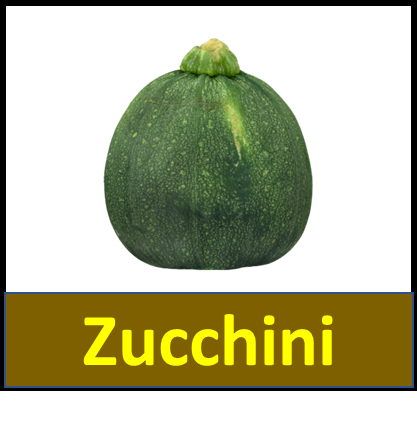
- Weight Management:
Zucchini is low in calories and carbohydrates, making it a great option for those looking to manage their weight. Its high water content and dietary fiber can promote a feeling of fullness, aiding in portion control and reducing overall calorie intake.
- Eye Health Support:
Rich in antioxidants like lutein and zeaxanthin, zucchini can contribute to maintaining healthy vision. These compounds help protect the eyes from oxidative damage and may reduce the risk of age-related macular degeneration.
- Hydration and Skin Health:
Zucchini’s high water content can aid in staying hydrated, benefiting overall skin health and appearance. The presence of vitamins A and C in zucchini also supports collagen production, contributing to youthful and radiant skin.
Cabbage
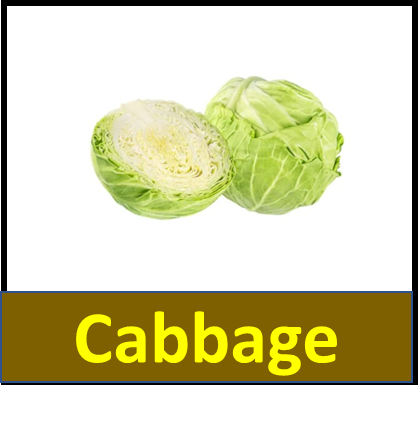
- Gut Health Improvement:
Cabbage is a rich source of dietary fiber and contains compounds that support the growth of beneficial gut bacteria. This can enhance digestion, promote regular bowel movements, and contribute to a healthy gut environment.
- Immune System Boost:
Packed with vitamins like vitamin C and antioxidants, cabbage can strengthen the immune system’s defenses. These nutrients help the body fight off infections and protect against various illnesses.
- Cancer Prevention Potential:
Cabbage contains glucosinolates, which are compounds that have been associated with cancer-preventive effects. These compounds can help detoxify and eliminate harmful substances from the body, reducing the risk of certain types of cancer.
Okra
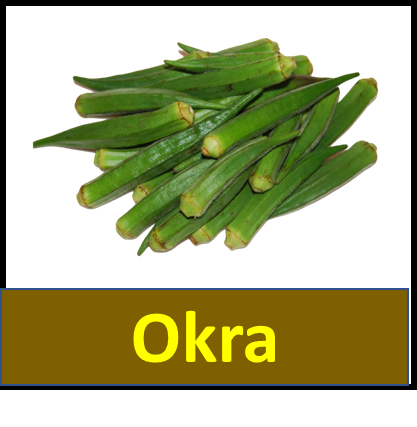
- Blood Sugar Regulation:
Okra contains soluble fiber, which helps slow down the digestion and absorption of sugars. This can contribute to stabilized blood sugar levels, making okra a beneficial choice for individuals with diabetes or those aiming to manage their blood sugar.
- Digestive Health Support:
The fiber content in okra promotes healthy digestion by preventing constipation and maintaining regular bowel movements. Additionally, the mucilage in okra may soothe and protect the digestive tract.
- Bone Health Enhancement:
Rich in vitamin K, calcium, and magnesium, okra plays a role in maintaining strong bones and preventing bone-related issues. These nutrients are essential for bone mineralization and overall skeletal health.
Tamarind
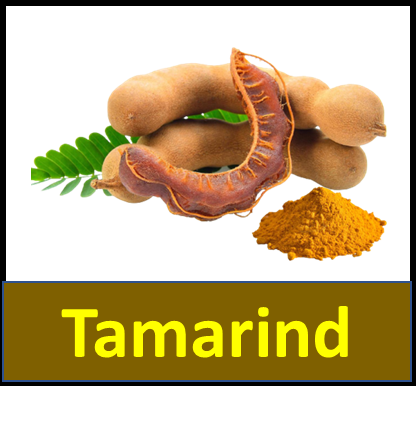
- Digestive Aid:
Tamarind contains natural enzymes and dietary fiber that can aid digestion by promoting regular bowel movements and preventing constipation. Its mild laxative effects can help maintain a healthy gastrointestinal system.
- Anti-Inflammatory Properties:
Tamarind contains compounds like polyphenols and flavonoids with anti-inflammatory effects. These antioxidants help reduce inflammation in the body, potentially benefiting individuals with inflammatory conditions.
- Heart Health Support:
Tamarind contains potassium, which is essential for maintaining proper heart function and blood pressure levels. Additionally, its fiber content can help manage cholesterol levels, contributing to cardiovascular well-being.
Tomato
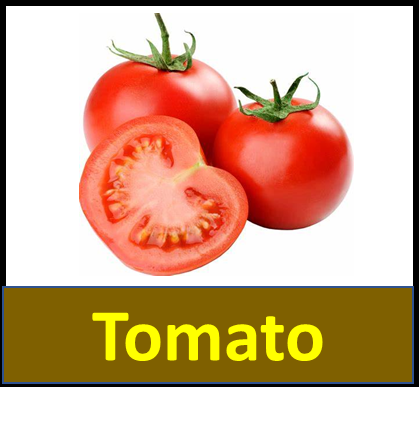
- Antioxidant Rich:
Tomatoes are packed with antioxidants like lycopene, vitamin C, and beta-carotene. These compounds help combat free radicals in the body, reducing the risk of chronic diseases and promoting overall health.
- Skin Health Enhancement:
Lycopene, found abundantly in tomatoes, can help protect the skin from UV damage and promote a healthy complexion. It may also contribute to reducing the signs of aging and maintaining skin elasticity.
- Heart Health Promotion:
The potassium and folate content in tomatoes can support heart health by helping to regulate blood pressure and reducing the risk of heart disease. Additionally, the lycopene in tomatoes may help lower LDL cholesterol levels.
Watercress
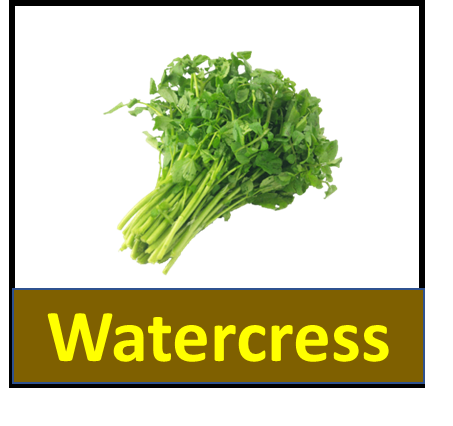
- Nutrient Powerhouse:
Watercress is rich in vitamins and minerals, including vitamin C, vitamin K, calcium, and iron. Its nutritional density supports overall health, immunity, and the proper functioning of various bodily systems.
- Bone Health Support:
The high vitamin K content in watercress is crucial for bone health, as it aids in calcium absorption and bone mineralization. Regular consumption can contribute to maintaining strong and healthy bones.
- Antioxidant Boost:
Watercress contains a variety of antioxidants, such as beta-carotene and lutein. These compounds help protect cells from oxidative damage, potentially reducing the risk of chronic diseases and promoting longevity.
RELATED:
